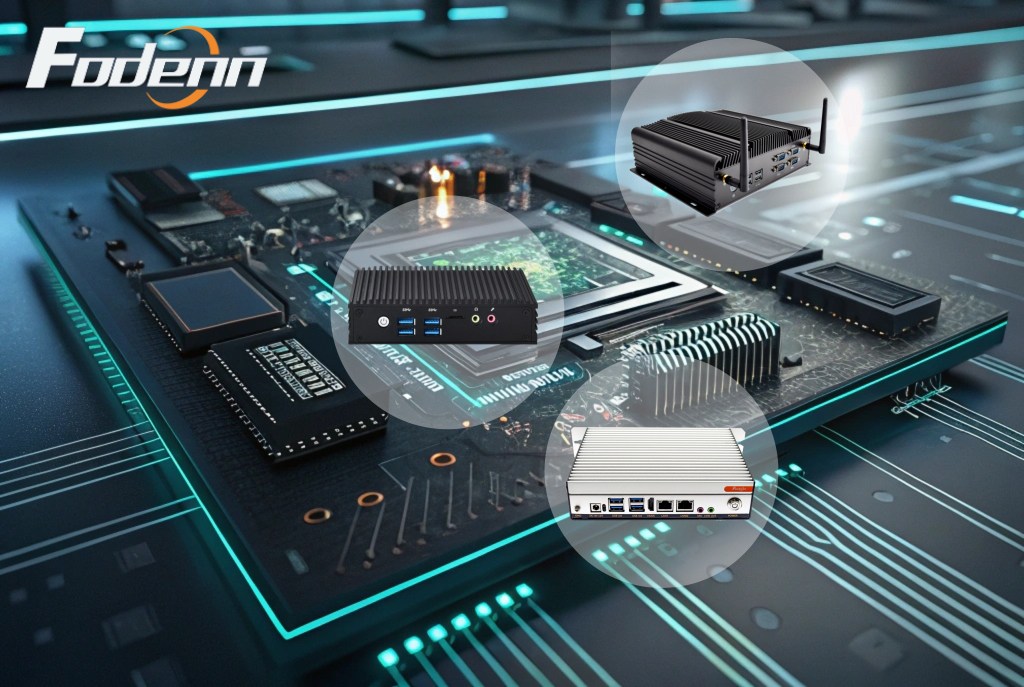Embedded computer systems are the dedicated part of modern technology, found at the heart of a vast array of devices from smartphones to industrial machinery, from the simplest to the most complex. These systems are dedicated computers that perform a specific function within a larger mechanical or electrical system. Fodenn, a leading embedded computer manufacturer, has been at the forefront of this technology, providing innovative solutions that power the brains of modern devices.
Components of an Embedded System
The core components of an embedded system are crucial to its operation.
A. Processors
Processors are the brains of the embedded system. Fodenn's industrial embedded computers utilize high-performance low power consumption CPUs (Intel Alder Lake N95 N100 N200 N300,Intel Tiger Lake, Intel 11th 12th 13th 13th Gen Core i7/i5/i3) that can handle complex computations and multiple tasks simultaneously. These processors are chosen for their ability to deliver the speed and efficiency required in today's fast-paced technological environment.
B. Memory
Memory is vital for the storage and retrieval of data. Fodenn offers a range of memory options in the Ram DDR4 DDR5 Industrial Mini PC, ensuring that these embedded computers can handle large data sets and maintain high performance levels.
C. Input/Output Interfaces
Interfaces are essential for communication within the system and with external devices. Fodenn's Multiple interfaces mini computer come equipped with a variety of I/O options, including multiple USB ports,serial ports, and Ethernet connections, facilitating seamless integration into various systems.

Characteristics of Embedded Systems
Embedded computing systems are known for their real-time operation and ability to function within resource constraints.
A. Real-Time Operation
Fodenn's x86 embedded computers are designed to respond instantly to input, making them ideal for applications where timing is critical.
B. Resource Constraints
These systems are built to operate efficiently within limited power and space constraints, a necessity in the compact design of many modern devices.
C. Customizability
Fodenn stands out with its ability to customize the rugged industrial control PC to meet unique customer needs, ensuring each system is tailored to fit its intended application perfectly.
D. Reliability and Robustness
Embedded systems must be reliable and robust, operating continuously without failure. Fodenn's commitment to quality ensures that their systems meet the highest standards of reliability.
E. Low Power Consumption
Low power consumption is essential for battery-operated devices and for reducing energy costs in industrial settings. Fodenn's low power fanless mini pc systems are designed with energy efficiency in mind.
Types and Applications of Embedded Systems
Embedded systems come in various forms, including microcontroller-based, PC-based, network-based, and application-specific systems. Fodenn's fanless embedded pc IPC-AC500 and IPC-AC82L are examples of PC-based systems that offer advanced features and capabilities. Embedded computing systems are the backbone of many industries, including consumer electronics, industrial automation, transportation, medical devices, and aerospace and defense.
Challenges and Future Trends in Embedded System Design
The development of embedded computer systems involves gathering requirements, designing the system architecture, developing software, integrating hardware and software, and rigorous testing and validation. Designers of embedded systems face challenges such as limited resources, the need for multidisciplinary collaboration, security concerns, and ensuring longevity and support for legacy systems. The future of embedded systems includes IoT integration, AI and machine learning capabilities, edge computing, and a focus on energy harvesting and sustainability.
Fodenn's Embedded Computer Systems
Fodenn's IPC-AC500 and IPC-AC82L series industrial embedded computers are prime examples of the evolution of embedded computing. These systems boast high-performance processors and ample memory configurations, making them powerful tools for a variety of applications. Fodenn's focus on customizability, reliability, and advanced I/O capabilities makes their embedded computers standout in a crowded market.
Embedded systems are more important than ever, driving innovation across industries. Fodenn's commitment to advancing embedded computer technology with products like the IPC-AC500 and IPC-AC82L ensures that they will continue to play a crucial role in the development of tomorrow's technology. At Fodenn, we are proud to provide some of the world's leading industrial embedded computer to customers across a range of industries. Browse our range or reach out to our team directly to learn more.